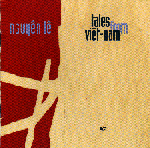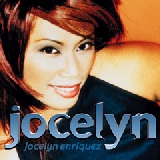Nguyen Le / Tales from Viet-Nam / ACT 1996
 Too bad fusion guitarist Nguyen Le is not Asian American.
Instead he is Asian French, or rather Vietnamese French. If he were based
in North America, maybe he would find much encouragement to put out more
albums like this one. It's a veritable tour-de-force!
Too bad fusion guitarist Nguyen Le is not Asian American.
Instead he is Asian French, or rather Vietnamese French. If he were based
in North America, maybe he would find much encouragement to put out more
albums like this one. It's a veritable tour-de-force!
In the liner notes, Nguyen says he has dreamt
for years of mixing jazz with Vietnamese traditional music. He seems to
have accomplished that goal, as is evident by the carefully crafted arrangements
(sometimes with the assistance of Dominique Borker). Each cut is
an adventure in listening, with layers of sounds produced by a whole slew
of instruments including: keyboards, horns, bass, percussion, flutes, saxophone,
guitars, guitar-synthesizer, and marimba. Added to that are Vietnamese
instruments like the dan tranh (zither), dan bau, (single-string
that sounds similar to a bowed saw), and dan nguyet (moon lute).
(It's worth mentioning that the tabla of Trilok Gurtu plays a prominent
role in a few pieces.)
Nguyen has also done a remarkable job of balancing the
two musics. Most of the pieces are based on Vietnamese traditional, popular
songs. (Two cuts, though, incorporate melodies by minority groups in Vietnam.)
Typically, the traditional song is introduced early on in a piece. The
glissandos of Hoang Thanh's vocals sparkle in the foreground of the pentatonic
tunes, and are soon followed by jazz-rock fusion. There are few wasted
notes or beats. Just when you get accustomed to a phrase or theme, the
music shifts tempo, time signature, and instrumentation.
Initially, this album does not seem
to lend itself well to the role of background music. Indeed, I found my
ear tended to be drawn to the Vietnamese singing, and ignored the restless
swirl of rhythms and chord progressions. Now that I know what to expect,
the instrumental parts do not rush by. With each new attentive listening,
I have found new aspects of the music to enjoy.
Seiko / Was It The Future / A&M 1996
Faith / in search of faith / lil' girl creations 1997
Jocelyn Enriquez / Jocelyn / Classified Records 1997
The cassette player in my car stopped working the other day. It's a sure sign to finally write something about these releases.
My mind has become so saturated from listening to them, that a fragment of a song will ooze into my consciousness, unbidden, and play. Perhaps the
likelihood of this occurrence is one of the things that marks it as popular music -- at least for a mind like mine that has been
conditioned by mass media.
In any event, I don't mean to directly compare these albums. For the most part, they're stylistically and sonically diferent from one another.
For certain songs, though, I'd like to switch singers. But perhaps I'm getting ahead of myself...
 Seiko Matsuda is one of the biggest pop stars in Japan, with dozens of albums and hit singles. Nevertheless, on this release
(reportedly her second stateside foray), there's an essential ingredient missing on most of the album.
Seiko Matsuda is one of the biggest pop stars in Japan, with dozens of albums and hit singles. Nevertheless, on this release
(reportedly her second stateside foray), there's an essential ingredient missing on most of the album.
Her voice.
To be more precise, she needs to project, to sing louder. It's a shame that her voice is often wispy, because the material is so strong.
This is a slickly produced collection of mostly R&B of diverse tempos, full of hooks, and infectious rhythms. (The uptempo songs are irresistably propulsive.)
Much credit is due Robbie Nevil, who wrote and coproduced most of the songs.
While Seiko's voice may have a tendency to fade out and get lost in a busy mix, her phrasing and embellishments show that she has the
right feel for R&B. Moreover, it's refreshing to hear melodies sung without the distraction of excessive gospel-styled glissando or warbling, that has become
a common vocal style. She also does quite well with some non-R&B, pop ballads. Her slight Japanese accent is no impediment to her conveying
the songs' sweeping lines.
Some degree of gospelized warbling is inescapable, these days. As one might expect, given the pervasiveness of American pop music, it has crossed the
Pacific and found favor with some pop singers in Japan. Perhaps a more striking example of foreign influence, is the common practice of sprinkling English
words into Japanese lyrics.
Might it be too far-fetched to wonder if Seiko's next U.S. release would reverse the practice and contain songs with Japanese words sprinkled amongst the English-language lyrics?
Perhaps, then, stateside listeners would have a fuller measure of her singing. Until that happens, they'll have to try getting
ahold of one of her 40 Japanese albums.
 In some ways, the aching and passionate vocals of Esther "Faith" Rivera would do well on Seiko's album. As the former demonstrates on her self-released album,
in search of faith, her voice cuts through the mix like a hot knife through margarine. The music is of the pop variety, at times shaded with rock, reggae, r&b, and other styles.
In some ways, the aching and passionate vocals of Esther "Faith" Rivera would do well on Seiko's album. As the former demonstrates on her self-released album,
in search of faith, her voice cuts through the mix like a hot knife through margarine. The music is of the pop variety, at times shaded with rock, reggae, r&b, and other styles.
All of the songs were written by her and focus on the personal and interpersonal. They range over topics like the nature of relationships, idealism, desire, and
comforting a dying grandmother. The CD booklet is very informative by providing lyrics and brief explanations of each song.
The recording was probably intended to highlight her heartfelt singing, since it seldom sounds processed. No doubt the transparency of the mix is due to the
efforts of Daniel Ho, who arranged and engineered the album. He also played almost all of the instruments. (Like Faith, Ho is originally from Hawaii. He has a string
of albums to his credit, especially as leader of the fusion-styled group, Kilauea.)
While his virtuosity is to be commended, there's a certain synergistic spontaneity lacking in the mix. Sometimes it seems that Faith is carrying the burden of moving
the songs along. Other times it seems her efforts overwhelm the rest of the music. Perhaps better results could be achieved with more inventive melodies, more syncopation,
and faster tempos.
Whatever the case, this album has enough going for it, that Faith should be able to attract favorable attention.

to be continued

Sign
My Guestbook
 View
My Guestbook
View
My Guestbook
Return to:
 Too bad fusion guitarist Nguyen Le is not Asian American.
Instead he is Asian French, or rather Vietnamese French. If he were based
in North America, maybe he would find much encouragement to put out more
albums like this one. It's a veritable tour-de-force!
Too bad fusion guitarist Nguyen Le is not Asian American.
Instead he is Asian French, or rather Vietnamese French. If he were based
in North America, maybe he would find much encouragement to put out more
albums like this one. It's a veritable tour-de-force! Seiko Matsuda is one of the biggest pop stars in Japan, with dozens of albums and hit singles. Nevertheless, on this release
(reportedly her second stateside foray), there's an essential ingredient missing on most of the album.
Seiko Matsuda is one of the biggest pop stars in Japan, with dozens of albums and hit singles. Nevertheless, on this release
(reportedly her second stateside foray), there's an essential ingredient missing on most of the album. In some ways, the aching and passionate vocals of Esther "Faith" Rivera would do well on Seiko's album. As the former demonstrates on her self-released album,
in search of faith, her voice cuts through the mix like a hot knife through margarine. The music is of the pop variety, at times shaded with rock, reggae, r&b, and other styles.
In some ways, the aching and passionate vocals of Esther "Faith" Rivera would do well on Seiko's album. As the former demonstrates on her self-released album,
in search of faith, her voice cuts through the mix like a hot knife through margarine. The music is of the pop variety, at times shaded with rock, reggae, r&b, and other styles.
